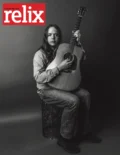The Spencer Dryden Benefit Concert May 22 at Slim's, a 500-600-capacity
club in San Francisco, appears to have been a big success in terms of
money raised. The five-hour-plus concert, hosted by Wavy Gravy and
featuring Bob Weir and Warren Haynes, was definitely a success in terms of
old friends getting together and making music for an old comrade.
Dryden's best known as drummer for Jefferson Airplane through its glory
years of 1966-1970, as well as work with New Riders of the Purple Sage and
the Dinosaurs. Recently, Dryden, 66, not only developed medical troubles
that require ongoing treatment, but last year he lost his home and all its
contents to fire.
A couple of dozen distinguished players, most with pretty lofty resumes
within the Bay Area gathered to make music and support Dryden.
Away from the stage, folks like Grace Slick, Jorma Kaukonen, Jack Casady,
Stanley Mouse and many other artists and musicians donated rock
memorabilia to be auctioned. Many more, less valuable items – posters,
video, books, etc. – were given out through a raffle throughout the show.
Fittingly emceed by Wavy Gravy, the show featured three groups, all with
beefed up personnel. Three players sat in with all three bands: Pete Sears
(keyboards, accordion), Barry Sless (pedal steel, lead guitars) and Jim
Sanchez (drums).
Nick Gravenites and Friends opened, featuring members of Quicksilver
Messenger Service and turned in a bluesy, hour-long set. I'm not
well-versed in Gravenites' material, but standouts for me were "Pride of
Man," a moderately successful Quicksilver single from 1966, led by the
still energetic vocals of David Freiberg. Despite the fact that Freiberg
and Gravenites looked like two old guys you'd see sitting on a park bench,
they performed quite well with plenty of energy. Quicksilver's Greg Elmore
sat in on drums for much of the set. Gravenites also led the group in the
Youngblood's "Get Together," with its lyric, "Come on people now, smile on
your brother." How old is Gravenites? Well, he closed with a song he said
he wrote for Paul Butterfield's Blues Band in 1965, called, "Born in
Chicago."
Wavy Gravy, who frequently changed psychedelic costumes and carried a big
stuffed fish, said during the first intermission as he presided over a
raffle, "We are all here at the Spencer Dryden fire sale … because we
love good music and we love Spencer."
Next up was David Nelson's band. Nelson has looked better in the past. His
hair is sparse and body thin, though he played admirably, and still had
some fire in his playing. After two songs, he played the rest of the set
while seated. Peter Rowan, who looked distinguished, healthy, but
decidedly older, joined the band. (Hey, at 45, I guess I look older than
the way I did in the 1970s, too). With Nelson and Rowan at front and
center, the band performed New Riders' classics "Panama Red" and "Lonesome
L.A. Cowboy," (formerly sung by New Riders' John Dawson) as well as
"Midnight Moonlight" from "Old and In the Way." Rowan left but Bob Weir
came out next. Now, with he and Nelson fronting the band, they performed
"The Wheel" and "Cumberland Blues," which was extra nice with Sless
playing a spirited pedal steel and Wavy Gravy behind the amps playing air
guitar on his fish. I believe David Nelson was a guest player on
"Workingman's Dead," the Grateful Dead album that featured that song 24
years ago.
Next intermission saw more raffles, and kind words about Dryden from old
Family Dog Chet Helms. Then Dryden came on-stage, leaning on a cane a bit
as he walked. Bill Thompson, the Airplane's old manager came out and
presented Dryden with two gold records. Dryden, a bit teary-eyed, then
said a few words of gratitude for the night's proceedings.
The final band was the Flying Other Brothers, who played three or four
jam-packed numbers before Weir returned. "Friend of the Devil" was first,
with the pedal steel guitar once again enhancing the jamming and adding a
bluegrass essence to the old number. Funny, some songs from the Grateful
Dead catalog, "Friend of the Devil" a prime example, are such well-known
classics that every musician seems to know it and it able to play it.
"When I Paint My Masterpiece" and "Cassidy," which featured a surprisingly
long and cohesive jam, followed. Between songs, as Weir stooped down and
fiddled with his pedals, Flying Other Brothers' Roger McNamee, to the
delight of the crowd said, "He's putting in the secret code to get rid of
the Bush administration. It's the latest thing in guitar technology." Weir
managed a modest smile.
Warren Haynes joined the fun next and provided lead guitar licks on
"Desolation Row." The band at this point, nine strong, had five
guitarists: two leads, two rhythm and bass. Tony Bove added to the
jamming, wailing on the harmonica. Haynes then sang the blues and played
masterful slide on Elmore James' "It Hurts Me Too," and sang "Sugaree"
before the band moved onto "Iko Iko." Weir's trademark "One More Saturday
Night" appeared to end the set, but afterward, Sears, who rarely takes the
mike, said "We'd like to do a special number." Accompanied by Weir and the
rest of the band, Sears sang "Stella Blue," leaving his friend Dryden with
some optimistic words.
It was then 12:45 a.m., and a closing jam featuring Peter Kaukonen and
Terry Haggerty was to follow. For me, it was time to head out of the city
and back to the mountains.



No Comments comments associated with this post